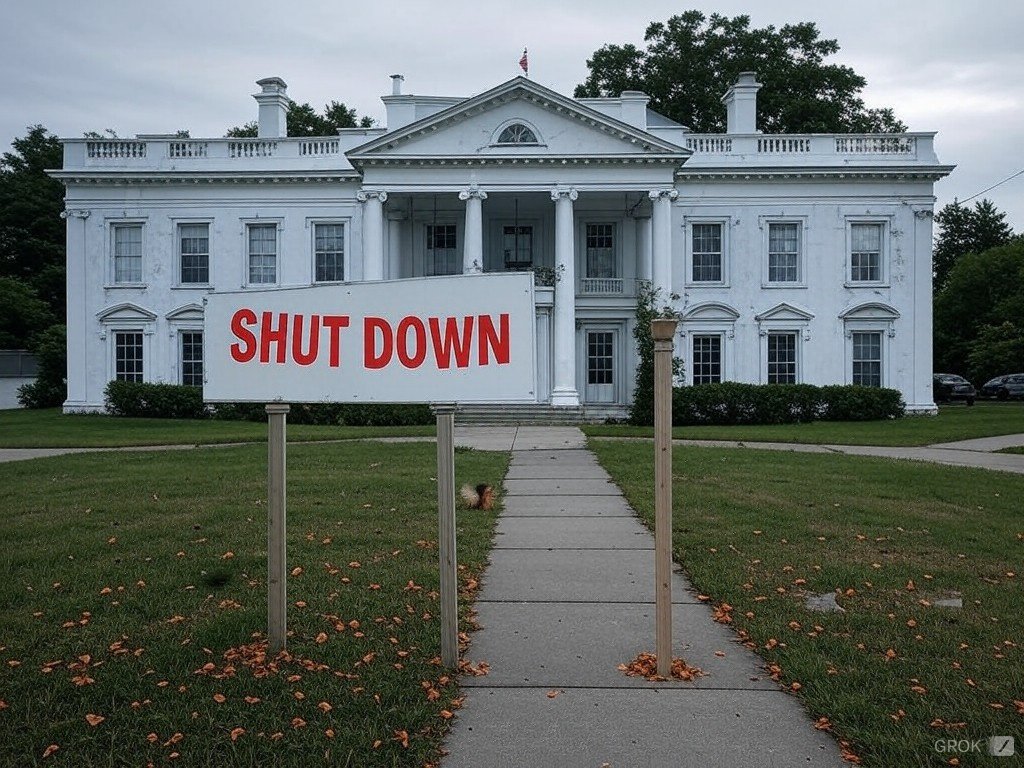
Opening Remarks
Government shutdowns are critical events that disrupt the functioning of a nation. These interruptions, although often temporary, expose the intricate dynamics within political systems. Understanding these events can provide valuable insights into the challenges faced by various governments.
In the United States, government shutdowns are typically the result of legislative gridlock, particularly concerning budgetary matters. These standoffs can cause significant disruptions to federal operations and services, highlighting the intense political debates that often take place in Congress.
However, the phenomenon of government shutdowns is not unique to the United States. Various countries around the world have experienced similar disruptions, each with its own set of causes and consequences. By examining government shutdowns outside the United States, we can gain a broader perspective on how different political systems handle crises and the impacts on their societies.
In Italy, for example, government shutdowns frequently occur due to a volatile political environment characterized by coalition governments and shifting alliances. The instability often leads to conflicts over economic policies and reforms, causing delays in public projects and creating uncertainty in financial markets. The resulting political instability can erode public confidence and lead to frequent elections or changes in the ruling coalition.
Belgium presents another unique case where government shutdowns stem from the country’s linguistic and regional divisions. The difficulty in forming coalitions that satisfy both Flemish and Walloon parties often leads to prolonged political deadlock. When shutdowns occur, essential public services are affected, causing frustration among citizens and weakening public trust in the government’s ability to maintain a coherent policy direction.
Australia’s government shutdowns typically arise from conflicts between the Senate and the House of Representatives over budget allocations and policy directions. These shutdowns can disrupt citizen services, including welfare and healthcare, prompting public discourse on government efficiency and transparency. Such events often serve as catalysts for broader discussions on political accountability and governance.
Exploring these instances of government shutdowns outside the United States reveals common threads of political discord, economic uncertainty, and public dissatisfaction. Each case provides a unique lens through which we can better understand the complexities of governance and the importance of effective political negotiation and compromise.

Recent Shutdowns in the United States
The United States has experienced several government shutdowns over the years, each reflecting a unique set of political challenges. Here is a list of the last five U.S. government shutdowns:
1. 2018-2019 Shutdown: This was the longest shutdown in U.S. history, lasting 35 days. It began over disputes regarding funding for a border wall. The impact was widespread, affecting federal workers and services.
2. January 2018 Shutdown: Lasting just three days, this shutdown was centered around immigration policies. The brief halt caused limited disruptions but highlighted deep-seated divisions in Congress.
3. October 2013 Shutdown: Triggered by disagreements over the Affordable Care Act, this shutdown lasted 16 days and furloughed hundreds of thousands of federal workers.
4. December 1995-January 1996 Shutdown: This 21-day shutdown was a result of conflicts between President Bill Clinton and the Republican-led Congress over budgetary matters.
5. November 1995 Shutdown: Prior to the longer shutdown in 1995, a five-day closure occurred due to budget disputes, foreshadowing the more extended crisis later that year.
Recently, President Joe Biden signed a bill on September 30th to keep the government open for 45 more days, allocating $16 billion for disaster relief. However, as Rep. Alexandria Ocasio-Cortez noted, the U.S. is likely to face another shutdown issue in November.

Shutdowns in Italy
Italy’s political scene is marked by a high degree of volatility, often driven by coalition governments and shifting party alliances. The resulting instability frequently leads to government shutdowns, which can have profound impacts on the country’s functionality and public perception.
Economic factors play a significant role in these shutdowns. Disputes over economic policies, budget allocations, and reforms are common, as different political factions often have competing agendas. These conflicts can lead to delays in public infrastructure projects, stalled economic initiatives, and general financial uncertainty. International investors may view these shutdowns as a signal of risk, potentially impacting Italy’s economic standing on the global stage.
The political consequences are equally significant. Coalition governments in Italy are often fragile, with parties holding divergent views on key issues. This fragility leads to frequent disagreements and power struggles, making it challenging to maintain a stable and effective government. When a shutdown occurs, it can exacerbate these tensions, sometimes resulting in the collapse of the current coalition and triggering early elections. This cycle of instability can hinder long-term policy planning and implementation, further complicating governance.
Public confidence in the government is also adversely affected by these shutdowns. Citizens may become frustrated with the lack of consistency and effectiveness in political leadership. This frustration can manifest in various ways, including public protests, lower voter turnout, and a general sense of disillusionment with the political process. The erosion of public trust can have long-lasting implications, affecting everything from compliance with government regulations to participation in civic activities.
Moreover, Italy’s unique political landscape, with its regional divisions and local issues, adds another layer of complexity. Regions like Lombardy and Sicily have distinct political priorities and economic conditions, making it even harder to achieve consensus on national policies. These regional differences can contribute to the gridlock that often precedes a government shutdown.
The frequent shutdowns in Italy serve as a vivid example of how political instability and economic disagreements can disrupt governance. The impact extends beyond the halls of power, affecting everyday citizens and the country’s broader economic and political health. Understanding these dynamics is crucial for appreciating the challenges that Italy faces in maintaining a functional and stable government.

Shutdowns in Belgium
Belgium’s political landscape is characterized by significant linguistic and regional divisions, primarily between the Flemish-speaking north and the French-speaking south. These divisions often lead to complex coalition-building processes, as parties must navigate these regional loyalties and linguistic barriers. As a result, forming a government that satisfies both Flemish and Walloon interests can be extraordinarily challenging.
Government shutdowns in Belgium typically arise when efforts to form a stable coalition government falter. The difficulty in achieving consensus among diverse political factions leads to prolonged periods without an effective government. During these times, essential public services, including transportation, healthcare, and administrative functions, can experience delays or disruptions, which causes public frustration and erodes trust in governmental effectiveness.
These shutdowns reflect deeper governance issues rooted in Belgium’s federal structure. The need to balance regional autonomy with national unity often results in protracted negotiations and compromises that may not fully satisfy any party involved. This delicate balancing act becomes particularly problematic when economic or social policies are at stake, as regional priorities can differ significantly.
The political deadlock during shutdowns can also stall critical legislation, affecting everything from economic reforms to social welfare programs. Such delays can have immediate and long-term consequences on the country’s economic stability and social cohesion. Businesses may face uncertainty, and citizens may find themselves without crucial services or support.
Belgium’s experience with government shutdowns underscores the challenges of managing a nation with deep-seated regional and linguistic divisions. While the federal system aims to provide a fair representation for all regions, it also complicates the governance process, often leading to stalemates that are difficult to resolve. These complexities highlight the need for effective political negotiation and compromise to ensure that the government can function smoothly and meet the needs of its citizens.
In summary, Belgium’s government shutdowns are a manifestation of the intricate dynamics within its political system. The challenges of coalition-building in a divided society create a fragile political environment where shutdowns are a recurring issue. Understanding these dynamics offers valuable insights into the broader challenges of governance in a multi-linguistic and regionally diverse nation.

Shutdowns in Australia
Shutdowns in Australia often arise from conflicts between the Senate and the House of Representatives. These legislative standoffs usually center around disagreements over budget allocations and policy directions. When such disputes reach an impasse, the government can come to a halt, affecting a wide range of public services and economic activities.
One notable aspect of these shutdowns is their impact on citizen services. Welfare programs, healthcare, and other essential services may experience delays or interruptions, creating immediate challenges for the public. These disruptions often prompt a broader conversation about the efficiency and transparency of government operations. Citizens and policymakers alike engage in discussions about how to improve the system to prevent future occurrences.
The political ramifications are significant as well. Government shutdowns in Australia can trigger extensive debates about political accountability and governance. These events often become focal points for criticism from opposition parties and the public, who may view them as signs of inefficiency and poor leadership. The political fallout can be substantial, influencing voter perceptions and affecting subsequent elections.
Economic consequences also accompany these shutdowns. The uncertainty created by legislative deadlock can affect financial markets, investor confidence, and overall economic stability. Businesses may face delays in government contracts and regulatory approvals, impacting their operations and financial planning. This economic uncertainty can ripple through the broader economy, affecting growth and employment rates.
The media plays a crucial role during these periods, providing continuous coverage and analysis. News outlets often focus on the causes of the shutdown, the political players involved, and the immediate impacts on the public. This media scrutiny can add pressure on lawmakers to resolve their differences quickly, but it can also deepen public frustration with the political process.
Australia’s experience with government shutdowns illustrates the complex interplay between legislative procedures, political dynamics, and public services. These events highlight the need for effective negotiation and compromise within the political system. By addressing the root causes of these conflicts, Australia can work towards more stable and efficient governance, ultimately benefiting its citizens and economy.

Final Thoughts
Government shutdowns, whether in the United States or other countries, are significant markers of political discord and operational dysfunction. These events provide critical lessons on the intricacies of governance and the multifaceted nature of political compromise.
In examining shutdowns across different nations, several common threads emerge. First, economic uncertainty is a prevalent consequence. Whether it’s the funding battles in the United States, economic policy disputes in Italy, or budget allocation conflicts in Australia, these shutdowns disrupt financial markets and public services. The economic impact can be immediate, with delays in public projects and services, and long-term, affecting investor confidence and overall economic stability.
Public trust is another casualty in the wake of government shutdowns. When political leaders fail to negotiate and reach compromises, the public’s faith in governmental effectiveness erodes. This erosion is evident in countries like Belgium, where linguistic and regional divisions complicate coalition-building, leading to prolonged periods without a functional government. The lack of effective governance not only frustrates citizens but also creates a sense of disillusionment with the political process.
Moreover, the political ramifications extend beyond the immediate crisis. Shutdowns often become focal points for criticism and debate, impacting subsequent elections and shifting public sentiment. The intense media scrutiny that accompanies these events can further amplify public dissatisfaction, putting additional pressure on political leaders to resolve their differences swiftly.
The complexity of managing diverse political interests is another lesson highlighted by these shutdowns. In Italy, coalition governments struggle with competing agendas, while in Belgium, regional and linguistic divisions create intricate challenges for forming a stable government. Australia’s legislative conflicts illustrate the difficulty of aligning budget priorities between different branches of government. These examples underscore the importance of effective negotiation and compromise in maintaining a functional political system.
Effective governance requires more than just resolving immediate conflicts; it demands a long-term commitment to addressing the underlying issues that lead to shutdowns. This includes fostering better communication between political factions, prioritizing the needs of citizens, and ensuring transparency in governmental operations. By focusing on these aspects, governments can work towards more stable and efficient governance, ultimately benefiting their societies.
In conclusion, government shutdowns serve as a powerful reminder of the importance of political collaboration and effective governance. The lessons drawn from these events, whether in the United States or other nations, highlight the need for a balanced approach that prioritizes economic stability, public trust, and political accountability. Understanding these dynamics is essential for building resilient political systems capable of navigating the complexities of modern governance.
